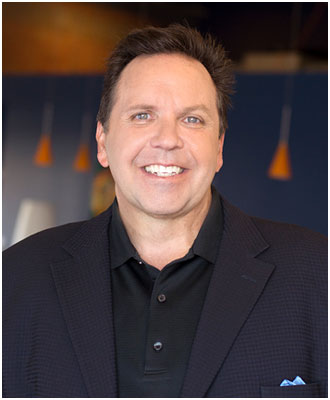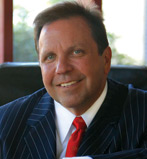Mike Flynt
- When All Else Fails…
- The truly great know how – and when – to adjust their game plan.
Mike Flynt was one of the toughest linebackers in the Lone Star Conference when he was playing for Sul Ross State University, and as that team’s senior captain, he had the Lobos ready for a breakout year in 1970. Flynt’s toughness, often displayed by his willingness to scrap at the drop of a hat, became a negative when he got into one too many fights. On the eve of his senior season, coaches kicked Flynt from the team. Not only did the fight end Flynt’s college career, it led to the unraveling of the Lobos season.
For 37 years, he carried the burden of letting his teammates down because he couldn’t control his fists.
In the summer of 2007, Flynt attended a team reunion where he confessed to his teammates that losing his senior season was the one regret in his life that he had never moved past. “You’re in great shape. Why don’t you go back and play?” asked one of his old teammates.
The idea took Mike by storm and he began researching the possibility as soon as he arrived home. An NCAA representative confirmed that, though he was 59 years old, Mike had one year of football eligibility remaining. All he had to do was make the team.
 He set himself on a path to go back and play football once again, competing against men 40 years his junior. As Mike prepared to leave his comfortable home in Nashville, TN for the South Texas desert with his wife of 35 years in tow, he had visions of playing football with abandon as a team leader – just like he did before he was kicked off the team four decades earlier.
He set himself on a path to go back and play football once again, competing against men 40 years his junior. As Mike prepared to leave his comfortable home in Nashville, TN for the South Texas desert with his wife of 35 years in tow, he had visions of playing football with abandon as a team leader – just like he did before he was kicked off the team four decades earlier.
“I didn’t come all that distance to sit on the bench or be a third string player. I came there because I believed I could still play,” Mike said during an interview for his autobiography, The Senior, which hit shelves last week. Though coaches and teammates at Sul Ross marveled at his ability to keep up despite the age difference, Mike found that he wasn’t the player he was at age 21. In 1970, he had flown all over the field hitting anything that moved; in 2007 he was used extensively on special teams, largely as blocking back on extra point tries.
He could have packed his bags and gone back to Nashville, declaring that he tried his best. But he didn’t. Like other Great ones, Mike Flynt knew that “When all else fails, winners know how – and when – to adjust their game plan.”
 An encounter with one of his teammates made him realize his role was to serve as a different kind of leader. Before practice one day, Flynt noticed that Jeremy Cartwright, a wide receiver with great speed, size and work ethic, was not mentally prepared for the workout. Cartwright explained that after a racially-charged confrontation with another student the day before, he was thinking of leaving the team and quitting school. “After what they said I didn’t fight. I just turned and walked away,” Cartwright told Flynt. “I was so depressed I’ve just stayed in my room.”
An encounter with one of his teammates made him realize his role was to serve as a different kind of leader. Before practice one day, Flynt noticed that Jeremy Cartwright, a wide receiver with great speed, size and work ethic, was not mentally prepared for the workout. Cartwright explained that after a racially-charged confrontation with another student the day before, he was thinking of leaving the team and quitting school. “After what they said I didn’t fight. I just turned and walked away,” Cartwright told Flynt. “I was so depressed I’ve just stayed in my room.”
Memories of how Flynt would have handled the situation in his younger days flooded his mind. He knew he would have flown into a rage in 1970 – and that was exactly why he lost his scholarship so many years ago. He grabbed Cartwright’s shoulders. “Don’t you see?” Flynt said. “The decision you made was in the best interest of you and your teammates. We need you out there and if you would have fought those guys it would have been selfish and you’d be gone. You did something I was never able to do. You walked away and I’m so proud of you. Who knows, you may go on to become an All-American because of that one right decision.”
Cartwright smiled from ear to ear. “Mike, you’re an angel,” he said
 Throughout the rest of the season, Flynt mentored many of his younger teammates. Instead of being the fiery on-field leader he had been in his previous playing days, Flynt became the heart of a Division III team that, by all accounts, over-achieved in the 2007 season.
Throughout the rest of the season, Flynt mentored many of his younger teammates. Instead of being the fiery on-field leader he had been in his previous playing days, Flynt became the heart of a Division III team that, by all accounts, over-achieved in the 2007 season.
Mike Flynt arrived in Alpine, Texas to play his last year of college football with one purpose in mind – he left having fulfilled a different, deeper purpose. And by both standards, he had a very successful “senior” season.
Tips from the Great Ones
Times change, people change, situations change. And as they do, so does your responsibility within an organization if you aspire to be part of something bigger than yourself. The great ones adapt. The great ones recognize it doesn’t matter what you came in with… it’s what you accomplish while you’re there. It doesn’t matter what your expectations were… it’s being successful while facing the conditions before you. The most important thing is what the organization – the team – needs from you. It is your responsibility to take on whatever role needed to lead your team to success.
Michael Jordan was the most creative and athletic slam-dunk artist in the NBA for his first eight years in the NBA. But Jordan’s career at the top of his field was extended as he developed a deadly three-point shot, hitting 43 percent of his three-pointers in his 10th season. Greg Maddux, who won four consecutive Cy Young awards in the early-90s, has a Major League best 17 straight seasons with 15 wins. When he arrived as the youngest player in the major leagues he had zip on his pitches. Last year, at age 42 and with much less velocity on the ball, he continued to befuddle batters by changing his pitching style.
 Mike Flynt did the same, adjusting his game plan to fit reality’s needs. He put his ego aside – a great challenge for many successful athletes and business people – and played an even more important role than the one he originally envisioned. If you’ve been a top producer at your company, could your new role be to mentor younger staff members during tough economic times? That’s what great winners do.
Mike Flynt did the same, adjusting his game plan to fit reality’s needs. He put his ego aside – a great challenge for many successful athletes and business people – and played an even more important role than the one he originally envisioned. If you’ve been a top producer at your company, could your new role be to mentor younger staff members during tough economic times? That’s what great winners do.
To learn more about Mike Flynt and The Senior, visit: www.MikeFlynt.com.
Tags: Greg Maddux, If you’re a Football fan, Michael Jordan, Mike Flynt, The Greatness Newsletter, The Ultimate Teammate, When All Else Fails, Writing






